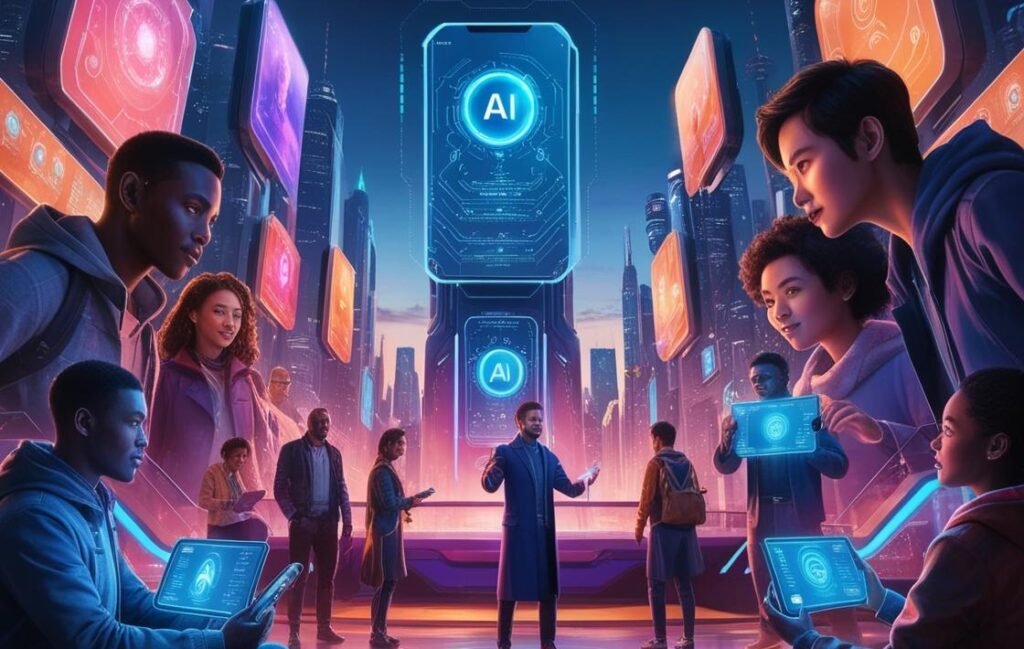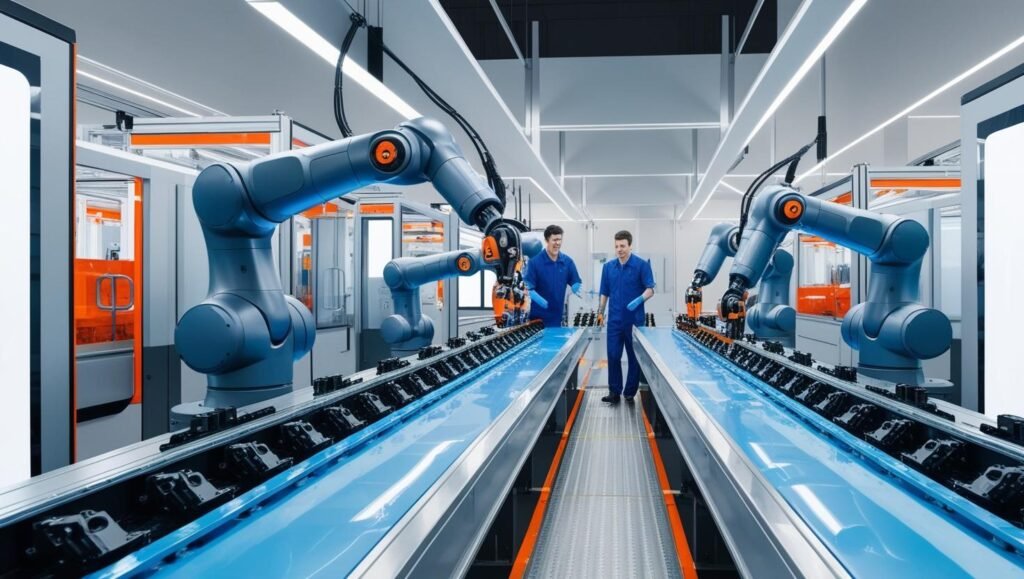AI in Action: Transforming Industries and Shaping the Future of Innovation

In an era defined by rapid technological evolution, artificial intelligence (AI) has emerged as a transformative force, reshaping industries and redefining the landscape of innovation. AI in action currently in various sectors From healthcare to finance and beyond, AI is not merely a trend; it is a revolution that empowers businesses to enhance efficiency, improve decision-making, and unlock unprecedented levels of creativity.
Imagine a world where intelligent algorithms analyze vast amounts of data in seconds, providing insights that were once unimaginable. This article delves into the dynamic applications of AI across various sectors, illustrating how it’s not just optimizing processes but also fostering groundbreaking discoveries and solutions.
As we explore the intersection of AI and industry, we’ll uncover how this powerful technology is not only shaping the future but also redefining what is possible in our everyday lives. Join us on this journey to understand how AI is in action, paving the way for a smarter, more innovative tomorrow.
The Role of AI in Various Industries
Artificial intelligence (AI) has transcended its origins as a concept in science fiction to become a pivotal technology across diverse industries. The capacity for AI to process and analyze vast amounts of data with remarkable speed and accuracy has made it an invaluable tool for businesses seeking to innovate and enhance their operations.
From healthcare and finance to manufacturing and retail, AI’s integration into industry practices is not just a possibility but a reality that is continually evolving.
The adoption of AI in various sectors is driven by its ability to address complex problems and provide solutions that were previously unattainable. In the healthcare industry, AI aids in diagnosing diseases, personalizing treatment plans, and predicting patient outcomes, thereby revolutionizing patient care.
In finance, AI algorithms enhance decision-making processes, detect fraudulent activities, and manage risk more efficiently than human capabilities alone. Manufacturing industries leverage AI to optimize production lines, improve product quality, and reduce waste, while retail businesses use AI to offer personalized customer experiences and streamline their supply chains.
As AI continues to permeate different industries, it is crucial to understand the nuances of its applications and the transformative impact it holds. The following sections delve deeper into specific sectors, illustrating how AI is not only optimizing existing processes but also paving the way for groundbreaking discoveries and innovations that shape the future.
AI in Healthcare: Revolutionizing Patient Care

Healthcare is one of the most promising fields where AI is making significant strides. The use of AI in healthcare encompasses a wide range of applications, from diagnostics to treatment planning and patient monitoring.
One of the most notable advancements is in medical imaging, where AI algorithms can analyze images from X-rays, MRIs, and CT scans with accuracy comparable to or even surpassing that of experienced radiologists. This capability allows for earlier detection of diseases such as cancer, leading to better patient outcomes.
Beyond diagnostics, AI is also transforming the way healthcare providers develop personalized treatment plans. By analyzing large datasets that include patient histories, genetic information, and treatment outcomes, AI can identify patterns and suggest tailored treatment options that are more likely to be effective for individual patients.
This personalized approach not only improves patient care but also reduces the likelihood of adverse reactions to treatments.
AI’s role in healthcare extends to predictive analytics, where it is used to forecast patient outcomes and disease progression. For instance, AI models can predict the likelihood of a patient developing complications after surgery, enabling healthcare providers to take preventive measures. Additionally, AI-powered wearable devices and remote monitoring tools allow for continuous tracking of patients’ health metrics, providing real-time data that can be used to make informed decisions and intervene promptly when necessary.
As AI technology continues to evolve, its potential to revolutionize patient care and improve healthcare delivery becomes increasingly apparent.
AI in Finance: Enhancing Decision-Making and Security

The finance industry has long been at the forefront of adopting innovative technologies, and AI is no exception. The integration of AI into financial services is transforming the way institutions operate, from enhancing decision-making processes to bolstering security measures.
One of the primary applications of AI in finance is in algorithmic trading, where AI systems analyze market data and execute trades at speeds and accuracies that are beyond human capabilities. This not only maximizes profits but also reduces the risk associated with market fluctuations.
In addition to trading, AI is revolutionizing risk management and fraud detection in the financial sector. AI algorithms can analyze vast amounts of transaction data to identify patterns and anomalies that may indicate fraudulent activities. By doing so, financial institutions can detect and prevent fraud more effectively, safeguarding their customers’ assets and maintaining trust.
Moreover, AI-powered risk assessment tools enable banks and financial advisors to evaluate the creditworthiness of clients more accurately, resulting in better lending decisions and reduced default rates.
AI is also enhancing customer service in finance through the use of chatbots and virtual assistants. These AI-driven tools provide customers with instant assistance, answering queries, and performing routine tasks such as balance inquiries and transaction history reviews.
This not only improves customer satisfaction but also frees up human agents to handle more complex issues. As AI continues to advance, its role in finance will undoubtedly expand, offering new ways to optimize operations, enhance security, and improve customer experiences.
AI in Manufacturing: Streamlining Processes and Increasing Efficiency

Manufacturing is another sector where AI is making a profound impact. The adoption of AI technologies in manufacturing processes is driving significant improvements in efficiency, quality control, and overall productivity.
One of the key applications of AI in manufacturing is predictive maintenance, where AI algorithms analyze data from machinery and equipment to predict potential failures before they occur. This proactive approach reduces downtime, minimizes repair costs, and extends the lifespan of equipment.
AI is also transforming quality control processes in manufacturing. Traditional quality control methods often involve manual inspections, which can be time-consuming and prone to human error. In contrast, AI-powered vision systems can inspect products at high speeds and with greater accuracy, identifying defects that might be missed by the human eye.
This ensures that only products meeting the highest standards reach the market, enhancing customer satisfaction and reducing returns.
Another significant application of AI in manufacturing is in the optimization of production processes. AI algorithms can analyze data from various stages of production to identify bottlenecks, optimize workflows, and improve resource allocation. This results in more efficient manufacturing operations, reduced waste, and lower production costs.
Additionally, AI-driven robots and automation systems are increasingly being used to perform repetitive and hazardous tasks, allowing human workers to focus on more complex and value-added activities. As AI technology continues to advance, its potential to revolutionize manufacturing processes and drive industry growth becomes increasingly evident.
AI in Retail: Personalizing Customer Experience

The retail industry is undergoing a transformation driven by AI, which is enabling businesses to offer more personalized and engaging customer experiences. One of the most prominent applications of AI in retail is in customer analytics, where AI systems analyze vast amounts of data from various sources, such as purchase histories, browsing behaviors, and social media interactions.
This data-driven approach allows retailers to gain deep insights into customer preferences and behavior, enabling them to tailor their marketing strategies and product offerings to meet individual customer needs.
AI is also enhancing the shopping experience through the use of recommendation engines. By analyzing customers’ past purchases and browsing patterns, AI algorithms can suggest products that are likely to be of interest to them. This not only increases the likelihood of sales but also enhances customer satisfaction by providing a more personalized shopping experience.
Furthermore, AI-powered chatbots and virtual assistants are becoming increasingly common in retail, providing customers with instant support and assistance, whether it’s answering product queries, processing orders, or handling returns.
In addition to improving customer interactions, AI is also optimizing supply chain management in the retail sector. AI algorithms can predict demand more accurately, enabling retailers to manage their inventory more effectively and reduce stockouts and overstock situations.
This results in lower operational costs and improved customer satisfaction, as products are more likely to be available when customers want them. As AI technology continues to evolve, its ability to enhance personalization and streamline operations in the retail industry will only grow, paving the way for a more efficient and customer-centric future.
The Impact of AI on Employment and Workforce Dynamics
The rapid adoption of AI across various industries is having a profound impact on employment and workforce dynamics. While AI has the potential to create new job opportunities and enhance productivity, it also raises concerns about job displacement and the future of work.
One of the primary concerns is that AI and automation technologies could replace human workers in certain roles, particularly those involving repetitive and routine tasks. This has led to fears of widespread job losses and increased unemployment.
However, it is important to recognize that AI also has the potential to create new job opportunities and enhance existing roles. As AI systems take over routine tasks, human workers can focus on more complex and value-added activities that require creativity, critical thinking, and emotional intelligence.
For example, in the healthcare industry, AI can assist doctors with diagnostics and treatment planning, allowing them to spend more time on patient care and communication. Similarly, in manufacturing, AI-powered robots can handle hazardous tasks, enabling human workers to focus on tasks that require problem-solving and innovation.
To address the challenges posed by AI and automation, it is essential to invest in education and training programs that equip workers with the skills needed to thrive in an AI-driven economy. This includes not only technical skills related to AI and data analysis but also soft skills such as adaptability, collaboration, and emotional intelligence.
Additionally, policymakers and businesses must work together to create supportive frameworks that ensure a just transition for workers affected by AI and automation. By embracing the opportunities and addressing the challenges, we can harness the potential of AI to create a more productive and inclusive workforce.
What Lies Ahead for AI Innovation
The rapid advancements in AI technology over the past decade have set the stage for even more exciting developments in the future. As AI continues to evolve, several key trends are likely to shape the trajectory of AI innovation and its impact on various industries.
One of the most significant trends is the increasing integration of AI with other emerging technologies, such as the Internet of Things (IoT), blockchain, and quantum computing. The convergence of these technologies has the potential to unlock new possibilities and drive even greater levels of innovation.
Another important trend is the growing focus on explainable AI, which aims to make AI systems more transparent and understandable to users. As AI becomes more pervasive in areas such as healthcare, finance, and law enforcement, it is essential to ensure that the decision-making processes of AI systems are transparent and can be easily understood by humans. This not only helps to build trust in AI systems but also enables users to identify and address potential biases or errors.
Additionally, the development of AI for social good is gaining momentum, with researchers and organizations exploring ways to leverage AI to address pressing global challenges, such as climate change, poverty, and public health. AI-powered solutions have the potential to provide valuable insights and drive innovative approaches to solving these complex issues.
For example, AI can be used to analyze environmental data and predict the impact of climate change, enabling policymakers to make informed decisions and implement effective mitigation strategies. As AI technology continues to advance, its potential to drive positive social impact and create a better future becomes increasingly apparent.
Conclusion:
As we explore the dynamic applications of AI across various industries, it is clear that AI is not just optimizing processes but also fostering groundbreaking discoveries and solutions. From revolutionizing patient care in healthcare to enhancing decision-making and security in finance, streamlining processes in manufacturing, and personalizing customer experiences in retail, AI is transforming the way businesses operate and innovate.
The impact of AI on employment and workforce dynamics presents both challenges and opportunities, highlighting the need for investment in education and training to equip workers with the skills needed to thrive in an AI-driven economy.
Ethical considerations in AI development are paramount, as we strive to ensure that AI systems are fair, transparent, and respectful of individual rights. Addressing issues such as bias, privacy, and accountability is essential to building trust in AI technology and ensuring its responsible deployment.
Looking ahead, the future of AI innovation is poised to be shaped by trends such as the integration of AI with other emerging technologies, the focus on explainable AI, and the development of AI for social good.
In conclusion, embracing the AI revolution requires a collaborative effort from researchers, businesses, policymakers, and society as a whole. By harnessing the potential of AI and addressing the associated challenges, we can pave the way for a smarter, more innovative future that benefits everyone. As we continue to navigate this transformative journey, it is essential to remain mindful of the ethical implications and strive to create an AI-driven world that is inclusive, equitable, and sustainable.
For the latest insights and updates, be sure to explore our AI Trends & News and stay ahead in the world of artificial intelligence.

Pingback: Claude Chatbot: Your Safe AI Companion - AI insights world